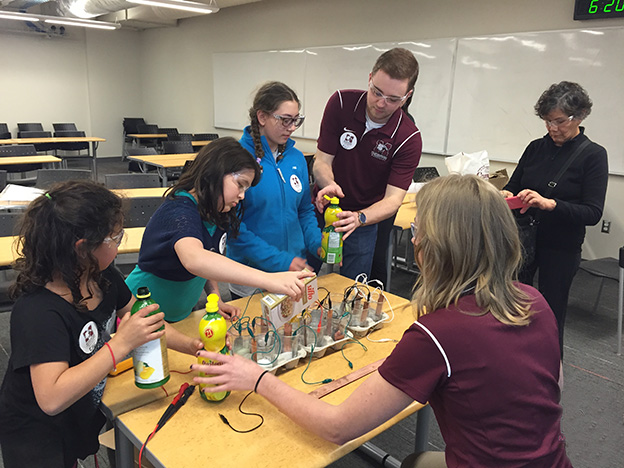McMaster’s EcoCAR team introduces youth to vehicle electrification

Rising fuel prices, strict emissions requirements and a growing public disdain for traditional, gas-powered cars is calling into question the future of the automotive industry.
Given these immense pressures, how can tomorrow’s engineers, scientists and vehicle technicians prepare to satisfy drivers’ inevitable demand for personal mobility?
This question is one that a team of McMaster students aims to address by familiarizing community members young and old with the virtues of vehicle electrification and eco-friendly motoring.
By introducing these concepts now, the McMaster Engineering EcoCAR 3 team hopes to facilitate understanding and acceptance of the technologies that will be commonplace in the future.
The four-year EcoCAR 3 challenge pits McMaster Engineering, Business and Communication students against teams from 15 other universities in North America in a race to make the 2016 Chevrolet Camaro lighter, faster, and more fuel-efficient.
The student-led team is made up of more than 70 volunteers from various levels and faculties.
Part of the team’s initiative involves running youth outreach events, to extoll the benefits of an education in automotive engineering and other related disciplines.
On April 22, the McMaster Engineering EcoCAR 3 Team hosted a group of students from the Hamilton chapter of the Canadian Association for Girls in Science (CAGIS) for a presentation on eco-friendly vehicle technology and a tour of the state-of-the-art McMaster Automotive Resource Centre (MARC) – the university’s hub for advanced vehicle research and development.
The event concluded with a hands-on activity involving homemade batteries and electromagnetic motors.
“Giving the girls from CAGIS a chance to work hands-on with these projects is great,” said Megan Wood, a member of McMaster Engineering EcoCAR 3’s electrical sub-team. “We hope they are now able to better understand the scientific theory and, critically, the practical applications for the theory as it applies to automotive technology.”
CAGIS is a nationwide network of girls, aged 7-16 who like science, technology, engineering, and mathematics and are interested in learning more about opportunities in certain fields.
The automotive industry of tomorrow will be shaped by our behaviour today. This ideal reflects the vision of McMaster Engineering EcoCAR 3.
“We are driven by our obligation to future generations to promote awareness of sustainable living through community outreach and bring about a new era in green technologies,” said Kamran Arshad, the team’s head of simulation and modelling.
Throughout the next four years of EcoCAR 3, the team will be working closely with macAUTO at MARC, McMaster’s coordinating body for vehicle research and education. The facility houses some of the most cutting-edge vehicle research, simulation, and testing tools as well as hundreds of academics, students, and industry representatives dedicated to improving the efficiency of the vehicles on Canadi

